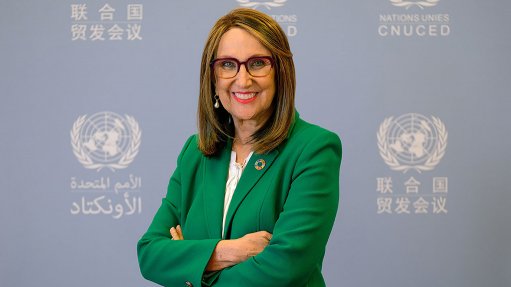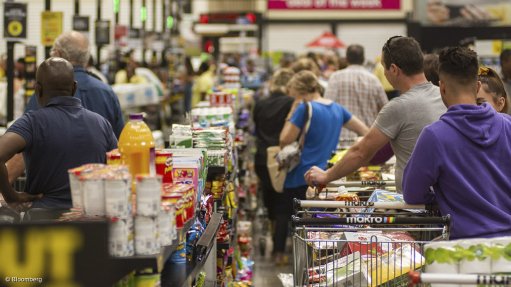The grim and terrible balancing act between fighting Covid-19 and protecting the economy
Covid-19: anxiety is everywhere. We are all concerned about our friends and colleagues who are at high risk. And there is the stress of the lockdown itself. It is a darkly humorous thought that many couples are finding out just how strong their relationships, whether formal or informal, really are. But at least they’ve got each other. Some of us are on our own, except for our cats and/or dogs.
And then there is the other source of stress: there is not a person in the country who owns a small or medium-sized business who does not fear that they are going to go bust. There is not a person working in the private sector (including me) who is not anxious that their jobs may disappear. And, even if we stay employed, what about our beloved friends and families? What about their businesses, their jobs?
South Africa’s peak infection rate is predicted to occur in September. This is because the current lockdown has delayed this grim milestone. But the lockdown cannot go on until September. There would be no economy left by then. No economy, no tax revenues, no funding for healthcare. Clearly, the lockdown has to end long before September. Leading South African epidemiologist Salim Abdool Karim has admitted that, when the lockdown ends, there will likely be an upsurge in Covid-19 infections. The lockdown has, however, gained the country some time.
Epidemiology is way beyond my area of expertise. As a journalist, I could easily formulate questions, although there is no guarantee that they would be intelligent ones! And what the Americans call ‘Monday morning quarterbacking’ is an incredibly easy thing to do. So, yes, I could throw out queries such as: Are the authorities really tracking the progress of the disease in informal settlements? (I hope so.) Or, a grimly ironic one: Did South Africa go into lockdown too soon?
Moreover, as observers overseas are beginning to point out, with regard to their own countries, lockdowns have health consequences too. In several countries, there is growing concern that cancer death rates could go up, as lockdowns disrupt treatment sessions (especially in countries where patients rely on public transport to get to hospital).
But again, questions are easy. Monday morning quarterbacking is wonderful. Hindsight is perfect. All we can ask is that the experts do their best and that the country’s political leaders listen to them and do their best, too. But they must remember the economy as well.
Of course, these dilemmas are universal. In every country, experts and Presidents and Prime Ministers and their Cabinets are grappling with the same deadly conundrum: when to end the lockdown, when to restart the economy? And there will be no one right answer. Each country will have its own right answer. Or, rather, each country will have to choose its own ‘lesser of the evils’ option.
However, the decisions made in one country can have effects on other countries, perhaps for good, perhaps for bad. For example, what if a country which is a major market for South African-manufactured goods or mineral exports comes out of lockdown and restarts its economy before South Africa does – would its South African suppliers lose market share because their clients in that country would, because of their need to restart production, have to vigorously seek alternative suppliers for the inputs they could no longer receive from South Africa? Or would the South African authorities be willing to partially lift the lockdown here so that local companies in such a situation would be able to restart their production in parallel with their overseas customers?
Likewise, what if countries which are major sources of tourism for South Africa lift their lockdowns and permit travel again before South Africa does? It is a very safe bet that, after lockdowns are lifted, those who can still afford it will want to travel. If South Africa is closed, they will go elsewhere. (The point is not that these foreign travellers will jump on planes immediately; it is that they will book such travel as soon as they can.) How long would it take South Africa to regain its global market share? Would it ever regain market share? After all, countries that are currently little travelled-to might, if they are open to travel at the right time, greatly increase their tourism profile. South Africa cannot be complacent.
Lockdown will destroy some companies (hopefully, only some), but weaken many more. Unemployment will go up in a country in which unemployment is already far too high. Unemployment means people have less money. That means they can spend less on food and particularly on nutritious food.
On top of this, independent South African research body the Bureau for Food and Agricultural Policy (BFAP) has predicted that prices for the country’s staple foods – maize, wheat and rice – will go up. Already, between March 2 and April 2, the average price of white maize jumped by 22% (in absolute terms). Consequently, the BFAP has forecast an increase in maize meal prices of some 12% during the next four months. All this means greater vulnerability to disease, including to Covid-19 and many other potentially lethal sicknesses.
Worldwide, peoples and their leaders have compared the struggle against Covid-19 to a war. In many respects, this is valid. This is especially so with regard to one very terrible fact: as in a war, whatever decisions leaders take regarding measures against the disease (maintain lockdown, lift lockdown), people will die. The aim has to be to minimise the number of those deaths. The need is to maintain the lockdown just long enough to be of benefit and then lift it (whether in a phased manner or all in one go) before it starts causing more harm than good.
Comments
Announcements
What's On
Subscribe to improve your user experience...
Option 1 (equivalent of R125 a month):
Receive a weekly copy of Creamer Media's Engineering News & Mining Weekly magazine
(print copy for those in South Africa and e-magazine for those outside of South Africa)
Receive daily email newsletters
Access to full search results
Access archive of magazine back copies
Access to Projects in Progress
Access to ONE Research Report of your choice in PDF format
Option 2 (equivalent of R375 a month):
All benefits from Option 1
PLUS
Access to Creamer Media's Research Channel Africa for ALL Research Reports, in PDF format, on various industrial and mining sectors
including Electricity; Water; Energy Transition; Hydrogen; Roads, Rail and Ports; Coal; Gold; Platinum; Battery Metals; etc.
Already a subscriber?
Forgotten your password?
Receive weekly copy of Creamer Media's Engineering News & Mining Weekly magazine (print copy for those in South Africa and e-magazine for those outside of South Africa)
➕
Recieve daily email newsletters
➕
Access to full search results
➕
Access archive of magazine back copies
➕
Access to Projects in Progress
➕
Access to ONE Research Report of your choice in PDF format
RESEARCH CHANNEL AFRICA
R4500 (equivalent of R375 a month)
SUBSCRIBEAll benefits from Option 1
➕
Access to Creamer Media's Research Channel Africa for ALL Research Reports on various industrial and mining sectors, in PDF format, including on:
Electricity
➕
Water
➕
Energy Transition
➕
Hydrogen
➕
Roads, Rail and Ports
➕
Coal
➕
Gold
➕
Platinum
➕
Battery Metals
➕
etc.
Receive all benefits from Option 1 or Option 2 delivered to numerous people at your company
➕
Multiple User names and Passwords for simultaneous log-ins
➕
Intranet integration access to all in your organisation

















